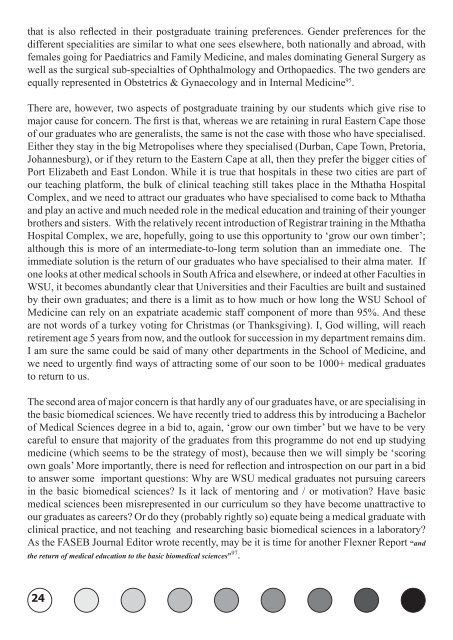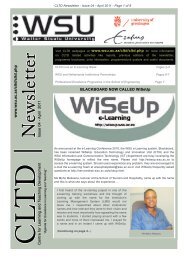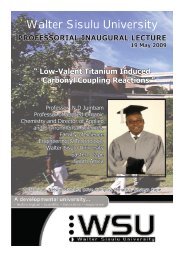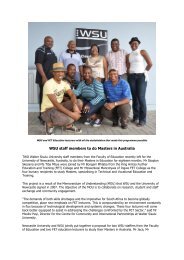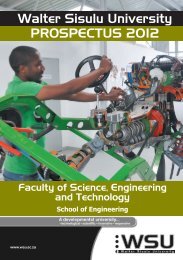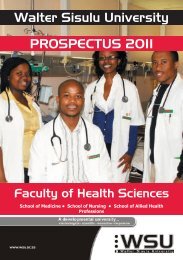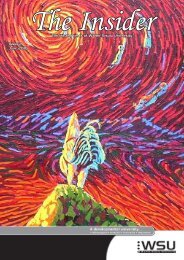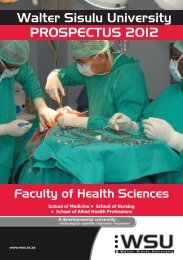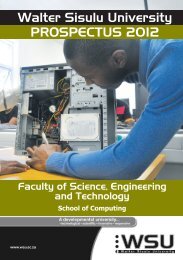25 years of training doctors at WSU: how - Walter Sisulu University
25 years of training doctors at WSU: how - Walter Sisulu University
25 years of training doctors at WSU: how - Walter Sisulu University
Create successful ePaper yourself
Turn your PDF publications into a flip-book with our unique Google optimized e-Paper software.
th<strong>at</strong> is also reflected in their postgradu<strong>at</strong>e <strong>training</strong> preferences. Gender preferences for the<br />
different specialities are similar to wh<strong>at</strong> one sees elsewhere, both n<strong>at</strong>ionally and abroad, with<br />
females going for Paedi<strong>at</strong>rics and Family Medicine, and males domin<strong>at</strong>ing General Surgery as<br />
well as the surgical sub-specialties <strong>of</strong> Ophthalmology and Orthopaedics. The two genders are<br />
equally represented in Obstetrics & Gynaecology and in Internal Medicine 95 .<br />
There are, <strong>how</strong>ever, two aspects <strong>of</strong> postgradu<strong>at</strong>e <strong>training</strong> by our students which give rise to<br />
major cause for concern. The first is th<strong>at</strong>, whereas we are retaining in rural Eastern Cape those<br />
<strong>of</strong> our gradu<strong>at</strong>es who are generalists, the same is not the case with those who have specialised.<br />
Either they stay in the big Metropolises where they specialised (Durban, Cape Town, Pretoria,<br />
Johannesburg), or if they return to the Eastern Cape <strong>at</strong> all, then they prefer the bigger cities <strong>of</strong><br />
Port Elizabeth and East London. While it is true th<strong>at</strong> hospitals in these two cities are part <strong>of</strong><br />
our teaching pl<strong>at</strong>form, the bulk <strong>of</strong> clinical teaching still takes place in the Mth<strong>at</strong>ha Hospital<br />
Complex, and we need to <strong>at</strong>tract our gradu<strong>at</strong>es who have specialised to come back to Mth<strong>at</strong>ha<br />
and play an active and much needed role in the medical educ<strong>at</strong>ion and <strong>training</strong> <strong>of</strong> their younger<br />
brothers and sisters. With the rel<strong>at</strong>ively recent introduction <strong>of</strong> Registrar <strong>training</strong> in the Mth<strong>at</strong>ha<br />
Hospital Complex, we are, hopefully, going to use this opportunity to ‘grow our own timber’;<br />
although this is more <strong>of</strong> an intermedi<strong>at</strong>e-to-long term solution than an immedi<strong>at</strong>e one. The<br />
immedi<strong>at</strong>e solution is the return <strong>of</strong> our gradu<strong>at</strong>es who have specialised to their alma m<strong>at</strong>er. If<br />
one looks <strong>at</strong> other medical schools in South Africa and elsewhere, or indeed <strong>at</strong> other Faculties in<br />
<strong>WSU</strong>, it becomes abundantly clear th<strong>at</strong> Universities and their Faculties are built and sustained<br />
by their own gradu<strong>at</strong>es; and there is a limit as to <strong>how</strong> much or <strong>how</strong> long the <strong>WSU</strong> School <strong>of</strong><br />
Medicine can rely on an exp<strong>at</strong>ri<strong>at</strong>e academic staff component <strong>of</strong> more than 95%. And these<br />
are not words <strong>of</strong> a turkey voting for Christmas (or Thanksgiving). I, God willing, will reach<br />
retirement age 5 <strong>years</strong> from now, and the outlook for succession in my department remains dim.<br />
I am sure the same could be said <strong>of</strong> many other departments in the School <strong>of</strong> Medicine, and<br />
we need to urgently find ways <strong>of</strong> <strong>at</strong>tracting some <strong>of</strong> our soon to be 1000+ medical gradu<strong>at</strong>es<br />
to return to us.<br />
The second area <strong>of</strong> major concern is th<strong>at</strong> hardly any <strong>of</strong> our gradu<strong>at</strong>es have, or are specialising in<br />
the basic biomedical sciences. We have recently tried to address this by introducing a Bachelor<br />
<strong>of</strong> Medical Sciences degree in a bid to, again, ‘grow our own timber’ but we have to be very<br />
careful to ensure th<strong>at</strong> majority <strong>of</strong> the gradu<strong>at</strong>es from this programme do not end up studying<br />
medicine (which seems to be the str<strong>at</strong>egy <strong>of</strong> most), because then we will simply be ‘scoring<br />
own goals’ More importantly, there is need for reflection and introspection on our part in a bid<br />
to answer some important questions: Why are <strong>WSU</strong> medical gradu<strong>at</strong>es not pursuing careers<br />
in the basic biomedical sciences? Is it lack <strong>of</strong> mentoring and / or motiv<strong>at</strong>ion? Have basic<br />
medical sciences been misrepresented in our curriculum so they have become un<strong>at</strong>tractive to<br />
our gradu<strong>at</strong>es as careers? Or do they (probably rightly so) equ<strong>at</strong>e being a medical gradu<strong>at</strong>e with<br />
clinical practice, and not teaching and researching basic biomedical sciences in a labor<strong>at</strong>ory?<br />
As the FASEB Journal Editor wrote recently, may be it is time for another Flexner Report “and<br />
the return <strong>of</strong> medical educ<strong>at</strong>ion to the basic biomedical sciences” 97 .<br />
24


